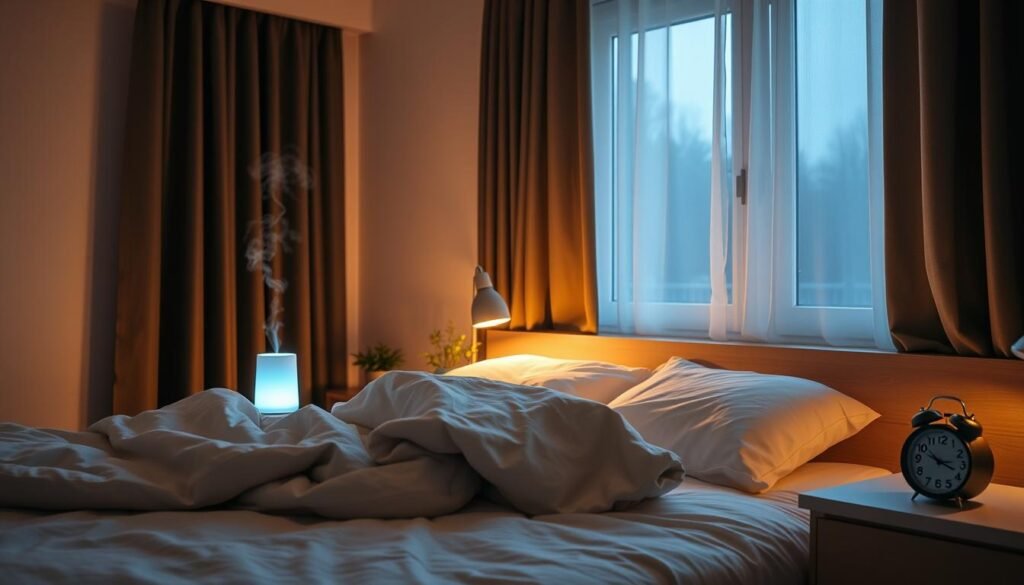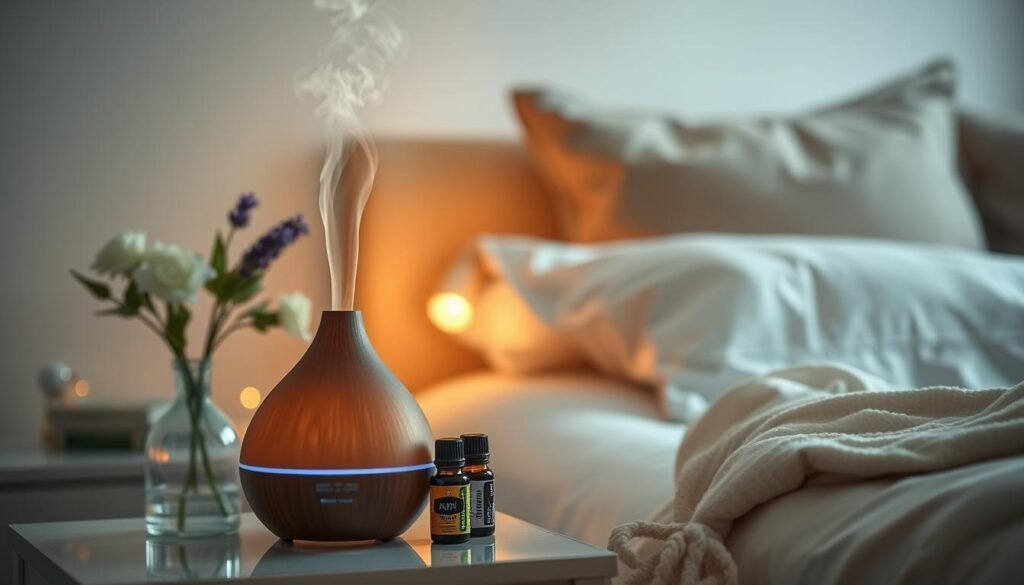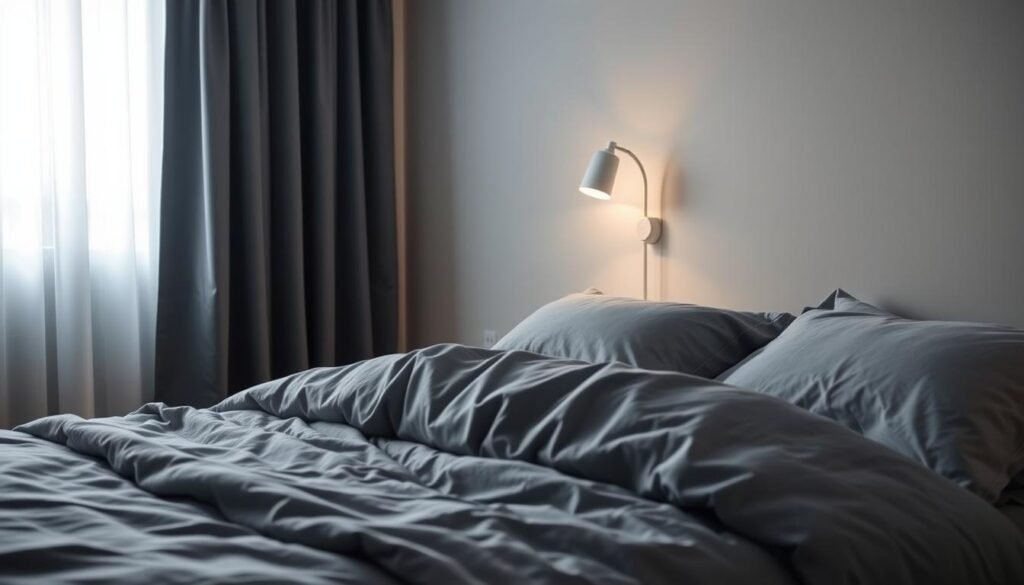Did you know that 60 million Americans struggle with sleep each year? Poor sleep can harm memory, focus, and mood. It can also lead to depression, obesity, type 2 diabetes, heart disease, and high blood pressure. But improving sleep might not be costly. In fact, simple everyday household items can be natural sleep aids.
This article explores common items that can make sleep better. From warm milk to chamomile tea and tart cherry juice, these can work wonders. They can help you get a good night’s sleep and boost your health.
These items can improve your sleep quality. Understanding their benefits can offer long-term sleep and health improvements.
Key Takeaways
- Over 60 million Americans experience sleep issues annually.
- Natural sleep remedies like chamomile tea and warm milk can enhance sleep quality.
- Good sleep hygiene is crucial for maintaining optimal health.
- Exposure to light from devices disrupts melatonin production, affecting sleepiness.
- The ideal sleep environment involves maintaining a room temperature between 65 and 72 degrees Fahrenheit.
The Importance of Sleep for Overall Health
Sleep is vital for our health. It helps our minds, emotions, and bodies stay well. Adults need at least seven hours of sleep every night. Kids need about nine hours, and teens should get eight to ten hours. Not sleeping enough can lead to obesity, diabetes, and heart problems.
Impact of Poor Sleep Quality
Not getting enough sleep can cause big health problems. Sleeping less than seven hours a night increases the risk of Type 2 diabetes. It also hurts our ability to think clearly. People sleeping five hours or less can make more mistakes within a week. Poor sleep also makes us feel hungrier because it changes our hormones. Sleep disorders like sleep apnea can make things worse if not treated.
Need for Natural Sleep Aids
Many people have trouble sleeping and need natural ways to help. Cognitive Behavioral Therapy (CBT) works well for long-term insomnia. For sleep apnea, CPAP machines are helpful. Creating a bedtime routine can improve sleep quality. We need to look at all ways to solve sleep problems and talk about sleep’s role in health.
Understanding Sleep Hygiene
Getting to know about sleep hygiene means learning the habits that help with restful sleep. This includes keeping a regular sleep time, making your sleeping area comfy, and staying away from things that keep you awake before bed. It’s key to pay attention to sleep hygiene as it greatly improves the quality of your sleep.
Defining Sleep Hygiene Practices
Sleep hygiene practices are routines that help you sleep better and feel good overall. The main steps are:
- Sticking to the same sleep schedule by going to bed and getting up at the same time every day.
- Setting up a comfortable sleep place, with a supportive mattress and a cool room temperature between 60-67°F (15.6-19.4°C).
- Avoiding caffeine 3-7 hours before sleep to ensure it doesn’t keep you awake.
- Reducing outside noise and light by using blackout curtains or white noise machines.
- Trying relaxation methods like meditation or controlled breathing right before bed.
Benefits of Good Sleep Hygiene
Adopting good sleep hygiene habits can bring many positive changes. Benefits include:
- Better sleep quality and less insomnia.
- More energy and better concentration during the day.
- Improved mood and mental health.
- Lower risk of problems caused by lack of sleep, including serious health issues.
By sticking to good sleep hygiene, people often see a big improvement in how they sleep. This helps a lot with their overall health. For more tips on improving sleep habits, check out this resource on sleep hygiene.

Everyday Household Items That Help You Sleep
Many people look for ways to sleep better. Household items can be natural aids for sleep, offering a simple way to relax before bed. Here are some popular options to consider.
Chamomile Tea as a Calming Drink
Chamomile tea is known for its calming effects. It’s rich in substances that may help you sleep better, making it great for fighting insomnia. Drinking warm chamomile tea before bed can be a calm routine that tells your body it’s time to rest.
This drink is free from caffeine, helping you relax and fall asleep easier. It’s a soft, effective way to relax at night.
Warm Milk and its Sleep-Inducing Properties
People have praised warm milk for helping with sleep. It has tryptophan, which helps make serotonin and melatonin—key sleep hormones. Drinking warm milk before bed can calm your mind from a busy day and bring coziness.
This old-time favorite is a natural, easy-to-add part of your night routine.
The Role of Tart Cherry Juice in Sleep
Tart cherry juice is known for its sleep benefits. Studies show it might boost melatonin levels, important for sleep patterns. Drinking this juice is a tasty way to improve your sleep.
With lots of antioxidants, it’s a top choice among sleep aids for better rest.
Using Essential Oils for Enhanced Sleep Quality
Essential oils have become popular for better sleep. Lavender oil is best known for its calming effects. Research shows lavender reduces how long it takes to fall asleep. It also increases deep sleep, making it perfect for relaxation through aromatherapy.
Lavender Oil and its Soothing Effects
Lavender oil is a natural sleep assistant. Studies show it improves sleep for people, especially those with anxiety or depression. A study in 2005 found it led to more deep-wave sleep and higher energy levels in the morning. Lavender’s calming effects make it ideal for a bedtime routine.
How to Use Essential Oils in Your Bedroom
There are many ways to use essential oils in the bedroom:
- Diffusion: A diffuser helps spread the scent all night, enhancing the benefits of essential oils.
- Topical Application: Mix lavender oil with a carrier oil before skin application. The usual mix is 1 teaspoon of carrier oil per drop of essential oil.
- Bathing: A few drops of lavender oil in a warm bath can make relaxation easier before bed.
- Pillow Spritzing: A spritz made from essential oils and water can create a calming bedroom or pillow mist.
- Inhalation: Rubbing a drop between the palms and inhaling the scent directly helps with relaxation.

Other oils like chamomile, jasmine, and cedarwood also promote sleep. Mixing chamomile and lavender can reduce anxiety, aiding sleep. The sense of smell plays a big role in emotional responses, making aromatherapy effective for sleep improvement.
| Essential Oil | Benefits | Application Method |
|---|---|---|
| Lavender Oil | Improves sleep quality, reduces anxiety | Diffuser, topical, bath |
| Chamomile Oil | Reduces anxiety, promotes sleep | Diffuser, spritzing, inhalation |
| Cedarwood Oil | Increases sleep duration and relaxation | Diffuser, topical |
| Jasmine Oil | Soothes and enhances sleep quality | Diffuser, bath |
Using these essential oils can make your sleep space more relaxing. Trying different application methods can suit your preferences, leading to better sleep every night.
Creating a Sleep-Friendly Environment at Home
A good night’s sleep is key to feeling great. Bedroom temperature and lighting are big factors in this. Making changes here can boost your sleep quality and overall happiness.
The Right Bedroom Temperature for Sleep
The perfect bedroom temperature for sleep is important. Experts say the best sleeping temperature is about 65 degrees Fahrenheit (18.3 degrees Celsius). They advise a range of 60 to 67 degrees Fahrenheit (15.6 to 19.4 degrees Celsius). This range matches your body’s natural sleep rhythm, helping you sleep better. Use breathable materials like cotton or bamboo for bedding. This keeps you comfortable and helps create the ideal sleep environment.
Darkness and its Influence on Sleep Quality
Light affects the hormone melatonin, which helps us sleep. For better sleep, your room should be very dark. Room-darkening curtains can block outside light. Reducing light, especially from screens, can enhance sleep by creating calm and relaxation. Discover more ways to sleep deeply by following this link.

| Sleep Environment Factor | Recommended Conditions |
|---|---|
| Bedroom Temperature | 60 – 67°F (15 – 19°C) |
| Light Exposure | Pitch-black darkness preferred |
| Bedding Material | Cotton, Bamboo, Silk |
| Color Scheme | Cool colors like blue |
Relaxation Techniques to Improve Sleep
Effective relaxation techniques are key to better sleep. Stress and anxiety are big reasons why people struggle with sleep. These worries make it hard to both fall and stay asleep at night. Adding breathing exercises to your night can help calm your mind and body. This makes falling asleep easier.
Breathing Exercises for Better Sleep
There are many helpful breathing techniques, like diaphragmatic breathing and the 4-7-8 method. They help relax you by relieving stress. Doing these breathing exercises lowers your anxiety and gets your mind ready for sleep. Techniques, like body scans, also help by shifting your focus away from daily stress.
The Effects of Gentle Music on Relaxation
Listening to gentle music at night can really help you relax. The calm music for sleep lowers stress, creating a peaceful setting. Studies show that soft tunes decrease heart rates and cortisol, the stress hormone. So, by adding soothing music to your bedtime routine, you might find it easier to relax. This can lead to better sleep.
Sleep Supplements Found in Your Kitchen
Many items in your kitchen can help you sleep better. Adding magnesium and tryptophan-rich foods to your dinner supports restful nights. These foods have nutrients that help you relax and sleep well.
Magnesium-Rich Foods for Better Sleep
Magnesium plays a key role in fixing sleep problems and lowering insomnia. Eat spinach, nuts, and seeds for more magnesium. A magnesium-rich diet lets you sleep faster and deeper.
| Food Source | Magnesium Content (mg per 100g) | Sleep Benefits |
|---|---|---|
| Spinach | 79 | May help regulate circadian rhythms |
| Almonds | 268 | Supports relaxation and sleep initiation |
| Pumpkin Seeds | 262 | Enhances sleep quality due to magnesium and zinc |
The Benefits of Tryptophan in Evening Snacks
Tryptophan is vital for making serotonin and melatonin, which control sleep. Eating dairy products and poultry as late snacks improves sleep. Try kiwi for better sleep duration and quality. Studies show eating two kiwis before bed helps you fall asleep quicker and sleep better.
Incorporating Bedtime Rituals
Good bedtime rituals can greatly improve how well you sleep and feel. A regular sleep schedule syncs your body’s clock. This makes falling asleep and waking up easier. Doing calming things before bed also helps you relax and sleep better.
The Benefits of Consistent Sleep Schedules
Sticking to a sleep pattern helps your body find its natural rhythm. For adults, a 30-minute to an hour routine works best. This consistency boosts sleep quality and alertness during the day.
How Reading Can Prepare You for Sleep
Reading before bed is a calm way to end the day. It leads to better sleep and less waking up at night. Making time for reading before bed reduces the desire for screen time, aiding in more peaceful sleep.
Importance of Limiting Screen Time Before Bed
Cutting down on screen time is key for a good night’s sleep. The blue light from devices can mess with melatonin production, making sleep harder. Switching off screens one hour before bed helps you relax. Instead, try reading or listening to calm music to get ready for sleep.
Conclusion
Getting better sleep is possible for all. By mixing natural solutions with a soothing bedtime routine, people can greatly improve their sleep. Using things like herbal teas and essential oils, along with good sleep practices, sets the stage for quality rest.
It’s also key to be cautious with over-the-counter sleep aids. Instead, exploring home remedies for sleep troubles is advised. Setting up regular bedtime habits, such as reading and exercises for breathing, helps enhance sleep. It also cuts down on the issues that tech gadgets can cause.
Putting a focus on good sleep is hugely beneficial to health. For those looking to better their sleep, a detailed summary of sleep aids and effective methods can be a game changer. By adding these approaches to your daily routine, improved sleep and a healthier life can be within reach.